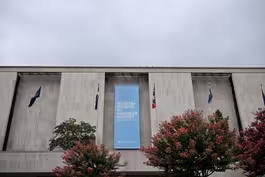
How marijuana reclassification could impact users, research
Clip: 8/20/2025 | 6m 29sVideo has Closed Captions
How the reclassification of marijuana could impact users, businesses and research
President Trump has promised answers soon on a potential shift in national drug policy. Last year, the Biden administration proposed moving marijuana from the DEA's Schedule 1 to Schedule 3, which wouldn’t make it legal on the federal level but would ease federal restrictions. John Yang discussed what that long-anticipated change could mean with Beau Kilmer of RAND's Drug Policy Research Center.
Problems playing video? | Closed Captioning Feedback
Problems playing video? | Closed Captioning Feedback
Major corporate funding for the PBS News Hour is provided by BDO, BNSF, Consumer Cellular, American Cruise Lines, and Raymond James. Funding for the PBS NewsHour Weekend is provided by...

How marijuana reclassification could impact users, research
Clip: 8/20/2025 | 6m 29sVideo has Closed Captions
President Trump has promised answers soon on a potential shift in national drug policy. Last year, the Biden administration proposed moving marijuana from the DEA's Schedule 1 to Schedule 3, which wouldn’t make it legal on the federal level but would ease federal restrictions. John Yang discussed what that long-anticipated change could mean with Beau Kilmer of RAND's Drug Policy Research Center.
Problems playing video? | Closed Captioning Feedback
How to Watch PBS News Hour
PBS News Hour is available to stream on pbs.org and the free PBS App, available on iPhone, Apple TV, Android TV, Android smartphones, Amazon Fire TV, Amazon Fire Tablet, Roku, Samsung Smart TV, and Vizio.
Providing Support for PBS.org
Learn Moreabout PBS online sponsorshipDONALD TRUMP, President of the United States: Some people hate the whole concept of marijuana, because, if it does bad for the children, it does bad for people that are older than children.
But we're looking at reclassification and we will make a determination over the next -- I would say over the next few weeks.
GEOFF BENNETT: That was President Trump last week promising answers soon on a major potential shift in national drug policy.
John Yang is here with what that long-anticipated change could mean for marijuana users, businesses and research -- John.
JOHN YANG: Geoff, the federal Drug Enforcement Administration puts drugs into five categories, what are called schedules.
It's based on their medical value and potential for abuse and addiction.
Right now, marijuana is in the most restrictive category, Schedule I.
That's the same category as heroin and LSD.
Schedule II includes fentanyl and cocaine, III, Tylenol with codeine, steroids and testosterone, IV, Xanax and Valium, and, V, over-the-counter medications like Robitussin.
Last year, the Biden administration proposed moving marijuana from Schedule I to Schedule III.
That wouldn't make it legal on the federal level, but would ease federal restrictions.
Beau Kilmer is the co-director of RAND's Drug Policy Research Center.
Mr. Kilmer, I want to examine what this would do, moving from I to III, what would it do for various groups?
First of all, what would it do for individuals, whether they're using marijuana recreationally or for medicinal purposes?
BEAU KILMER, Co-Director, RAND Drug Policy Research Center: It wouldn't make much of a difference.
Realize that while 24 states have legalized cannabis for adult use, and we have got 40 states that legalize it for medical use, all of that activity at the state level is still illegal under federal law.
So if we were to move at the federal level from Schedule I to Schedule III, that wouldn't necessarily change what's happening at the state level.
JOHN YANG: And then for businesses, businesses that sell, dispensaries or other businesses that sell marijuana.
BEAU KILMER: They would benefit from this.
There's a part of the internal revenue code or the tax code which specifically says that, if a entity is trafficking a Schedule I or Schedule II drug, that means that they can't deduct normal business expenses under federal taxes.
So if you were to move cannabis from Schedule I to Schedule III, those businesses would then be allowed to deduct those expenses.
They'd make more money.
And on the public health side, there's a concern that what that would mean is that these businesses would then be able to write off advertising and marketing, so we'd see more promotion.
JOHN YANG: And what about for medical research and pharmaceutical companies?
BEAU KILMER: Yes, so, in general, you can do research on Schedule I drugs, but it turns out there are a lot of hoops that you need to jump through.
And so, in general, if you move from Schedule I to Schedule III, it should reduce some of those restrictions, reduce some of those administrative barriers.
However, the Congressional Research Service came out last year and said, look, there was a law that was passed in -- or a bill signed into law in 2022, which was specific to doing research on cannabis.
And so their takeaway on this is that moving cannabis from Schedule I to Schedule III isn't going to make much of a difference.
That said, some may argue that, by moving it from Schedule I to Schedule III, there could be less stigma.
So some researchers may be more likely to get involved.
But even, if on the margins, this reduces administrative barriers and if more people get involved or want to get involved in research, the bottom line is, who's going to pay for it?
The National Institutes of Health, they fund a lot of the research on cannabis.
And so a big question remains is, will there be money there to support this research?
JOHN YANG: The Gallup poll has been asking this question about support, public support for legalizing marijuana for some time.
In 1969, only 12 percent supported that position.
By 2023, 70 percent supported it.
You have been studying drug policy for 20 years.
How has the politics of this issue changed?
BEAU KILMER: It definitely has become more bipartisan or nonpartisan over time.
Early on, this was much more kind of a liberal or left issue and definitely is much more mainstream today.
JOHN YANG: Given the fact that the president doesn't use alcohol and talks about the effect of alcohol on his brother Fred, does it surprise you that he's coming out talking about reclassifying marijuana?
BEAU KILMER: Not necessarily.
People have been just talking about rescheduling cannabis for decades.
And in the previous administration, they were taking this seriously.
It stalled out at the end of the administration.
So it's not surprising that this is a topic of conversation, especially given where public support is for legalization.
JOHN YANG: In 2022, Gallup found that very slim majorities said that marijuana negatively affected both society and individuals.
What do we know about the health effects of marijuana use?
BEAU KILMER: I mean, like alcohol, most people who use cannabis don't run into problems.
And some of them actually do benefit from -- potentially from medicinal purposes.
But that doesn't mean that there aren't any risks or people don't run into problems, especially for those who use frequently and then are using kind of higher-potency cannabis.
Now, there are many issues here, for example, impaired driving.
There's increased evidence of cardiovascular risk for frequent users.
And then there are also mental health concerns, especially for youth and young adults who are frequently using these higher-potency products.
The thing to keep in mind is, a lot of the research that's been done on cannabis isn't necessarily based on the products that are being sold in stores.
And this needs to change.
But stepping back, allowing some of these higher-potency products, I mean, that really is a policy choice.
Policymakers could decide not to allow those products to be sold, or, if they do, they could implement THC caps, or they could tax cannabis in a way that nudges people towards some of those lower-potency products.
They're pros and cons with all of these different policy levers.
But this is something that should be part of our cannabis discussions.
JOHN YANG: Beau Kilmer of RAND, thank you very much.
BEAU KILMER: Thanks for having me.
As Russia wages war, NATO plans Ukraine's future defense
Video has Closed Captions
Clip: 8/20/2025 | 3m 39s | As Russia continues to wage war, NATO meets to plan Ukraine's future defense (3m 39s)
As vouchers expand, public districts fighting to hold on
Video has Closed Captions
Clip: 8/20/2025 | 6m 47s | As voucher programs expand, many public school districts are fighting to keep students (6m 47s)
Expert analyzes difficulties of Ukraine security guarantees
Video has Closed Captions
Clip: 8/20/2025 | 5m 49s | Expert analyzes difficulties of providing Ukraine with security guarantees (5m 49s)
Florida’s climate tech sector faces uncertainty after cuts
Video has Closed Captions
Clip: 8/20/2025 | 8m 39s | Florida’s climate-focused tech sector faces uncertainty after federal cuts (8m 39s)
News Wrap: Texas closer to approving new congressional maps
Video has Closed Captions
Clip: 8/20/2025 | 8m 34s | News Wrap: Texas lawmakers move closer to approving new congressional maps (8m 34s)
Scholar responds to Trump's efforts to reframe U.S. history
Video has Closed Captions
Clip: 8/20/2025 | 7m 10s | Scholar says Trump's efforts to reframe U.S. history is 'reminiscent of McCarthyism' (7m 10s)
Why the AAP is diverging from CDC vaccine guidelines
Video has Closed Captions
Clip: 8/20/2025 | 5m 55s | Why the American Academy of Pediatrics is diverging from CDC vaccine guidelines (5m 55s)
Providing Support for PBS.org
Learn Moreabout PBS online sponsorship
- News and Public Affairs

FRONTLINE is investigative journalism that questions, explains and changes our world.

- News and Public Affairs

Amanpour and Company features conversations with leaders and decision makers.












Support for PBS provided by:
Major corporate funding for the PBS News Hour is provided by BDO, BNSF, Consumer Cellular, American Cruise Lines, and Raymond James. Funding for the PBS NewsHour Weekend is provided by...






